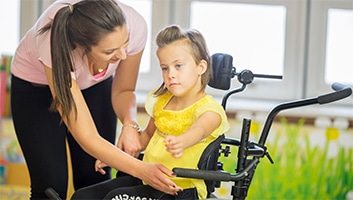The Power of a Live-In Caregiver with Therapeutic Expertise
Having a live-in Care Professional who has a therapeutic background offers a multitude of benefits that stem from their unique experience and training. Beyond traditional caregiving, they possess in-depth knowledge of child development, sensory integration, fine and gross motor skills that allow them to implement planned routines and exercises into a child’s daily life seamlessly.
They step into your home with their knowledge and experience, not to replace your current therapist(s), but to become an essential part of your in-home care team and foster new possibilities for your entire family. Consistently integrating plans over extended periods paves the way for continuous developmental progress. By living with and closely observing their host child, collaborative opportunities with the child’s parents arise, facilitating the exchange of insights, strategies, and techniques with the parents and care team.
An Apex Care Professional with this experience gives them the ability to implement behavior management strategies, social skills development, and cognitive skills enhancement. With the support of the family, care team and the Apex Educational & Therapeutic Team they can contribute to and implement strategies that address challenging behaviors, foster positive interactions, improve social skills, and enhance cognitive abilities essential for learning and problem-solving utilizing the Apex Individualized Care Plan. They can also help identify and implement adaptive equipment or assistive technology to support the child’s independence in daily activities.
By combining their education with the nurturing environment of the child’s home, a live-in Care Professional with a background in a therapy can significantly impact the child’s development, independence, and overall well-being, providing invaluable support for the entire family.
Therapeutic Child Care Professionals from Germany:

Physical Therapist (Physiotherapeut)
You can expect a Care Professional with this background to have had 3 years of vocational training or a 4 year Bachelor’s Degree.
Approximate hours: Theoretical training: 2,700 hours. Practical training: 1,700 hours

Occupational Therapist (Ergotherapeut)
You can expect a Care Professional with this background to have had 3 years of vocational training or a 4 year Bachelor’s Degree.
Approximate hours: Theoretical training: 2,700 hours. Practical training: 1,700 hours

Speech Therapist (Logopäde)
You can expect a Care Professional with this background to have had 3 years of vocational training or a 4 year Bachelor’s Degree.
Approximate hours: Theoretical training; 1,700 hours. Practical training 2,100 hours.
Therapeutic Child Care Professionals from the United States:

ABA (Applied Behavior Analysis) Therapist
ABA is a scientific approach to understanding behavior. ABA refers to a set of principles that focus on how behaviors change, or are affected by the environment, as well as how learning takes place. The term behavior refers to skills and actions needed to talk, play, and live.
Degree: In order to become a behavior analyst, you must earn a degree (bachelor’s or master’s degree) in the field or in a related field of psychology, gain necessary hands-on experience in different settings, and get board certification.
Duration: Becoming an ABA Therapist can take 4 to 7 years or more, depending on whether someone pursues a bachelor's degree, master's degree, and additional ABA coursework.

RBT (Registered) Behavior Technician
An RBT provides direct one-on-one behavioral interventions to teach communication, social, and daily living skills and reduce problematic behaviors in home, community, and school settings.
Degree: The RBT credential requires applicants to meet minimum age and education standards, obtain 40 hours of acceptable training, successfully complete a Competency Assessment, and a criminal background check then pass the RBT Exam. RBTs are registered with the BCBA board and will have a supervisor. Many people take the RBT training and test, but are not registered with the board after, which makes them a BT.
Duration: The process to become an RBT can take anywhere from a few weeks to a few months, depending on how quickly someone can complete the training, pass the competency assessment, and schedule an examination.

Mental Health Technician or Behavioral Health Technician
Mental Health Technicians or also known as Behavioral Health Technicians provide direct care and support to individuals with mental health disorders or emotional challenges. They play a crucial role in assisting and monitoring patients' well-being under the supervision of licensed mental health professionals, such as psychiatrists, psychologists, or psychiatric nurses.
Degree: Must obtain a high school diploma or equivalent. While a college degree is not always required, having a diploma is a fundamental prerequisite for most Mental Health Technician positions.
Duration: The overall time frame to become a Mental Health Technician/Behavioral Health Technician can range from a few months to a couple of years, depending on factors such as your prior education, the availability of training programs, and any additional certifications you pursue.
